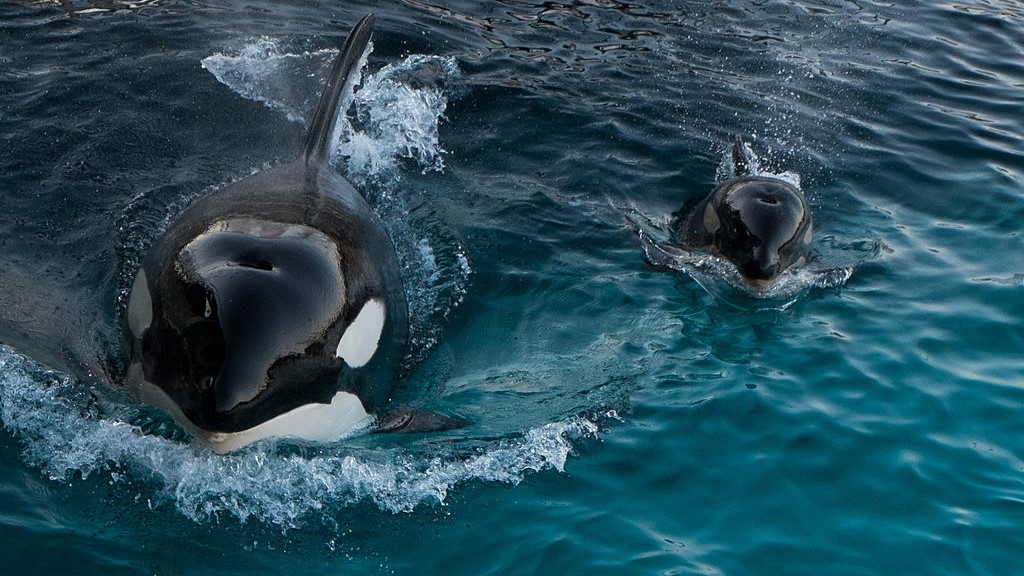
White Gladis, the orca that likely started the attacks on boats in Iberian waters, may have been so hellbent on stopping boats that she neglected her calf, experts say.
Experts think White Gladis was hit by a vessel or entangled in a fishing net — an event believed to have triggered the behavior that has since spread to over a dozen orcas.
"She went to the boats with this calf, so she preferred to stop the boats rather than keeping her baby safe," Mónica González, a marine biologist with the Coordinadora para o Estudo dos Mamíferos Mariños, or Coordinator for the Study of Marine Mammals (CEMMA), said in a webinar held June 11.
The timeline of the attacks also suggests White Gladis was pregnant when she first started targeting boats.
Unusual interactions between boats and orcas (Orcinus orca) off the coasts of Spain and Portugal began in the summer of 2020, which is when experts think White Gladis experienced the "aversive moment" that sparked the behavior.
White Gladis then gave birth at some point in 2021 following a 15 to 18-month gestation period.
The number of encounters involving physical contact between orcas and boats has increased year on year since those first interactions, resulting in three sunken boats and over 100 more damaged.
Related: Orca rams boat off Scottish coast, 2,000 miles away from original attacks
Orca calves rely on their mother for protection and nourishment for at least two years, until they learn how to hunt. Females have, on average, only five young during their lifetime and are fiercely protective of each, according to Robert Pitman, a marine biologist at Oregon State University's Marine Mammal Institute.
However, White Gladis' maternal instincts didn't stop her from approaching and ramming vessels along the Spanish and Portuguese coasts. Her decision to potentially jeopardize her newborn's safety suggests she'd suffered a severely traumatic incident, potentially related to a sailing boat towing a fishing line, González said in the webinar.
For White Gladis, "it was more important to stop the boats" than to protect her calf (called Gladis Filabres), which led experts to think that "something bad happened," González said.
Moving structures on boats, such as the rudder and propeller, could severely injure an orca calf.
Gladis Filabres is one of 11 identified juveniles that are now targeting the rudders of boats off the Iberian coast with ruthless and speedy efficiency. "Orcas have echolocation, so they can see the rudder inside and outside, and they know how to touch it to break the rudder," González said.
The behavior appears to be spreading through the Iberian population through social learning. Juveniles and calves imitate adults and each other, reproducing behaviors they deem advantageous or interesting, Alfredo López Fernandez, a biologist and representative of the Grupo de Trabajo Orca Atlántica, or Atlantic Orca Working Group (GTOA), previously told Live Science.
While juveniles and calves likely engage in the behavior out of curiosity and playfulness — "like a child playing with a football in the kitchen and breaking a window" — adults are more likely to interact with boats due to anguish or trauma, González said.
And the orcas show no signs of stopping their attacks anytime soon. On June 22, three orcas attacked a boat participating in an endurance sailing race near the Strait of Gibraltar, ramming its rudders and hull. The crew immediately dropped the sails to slow the boat. The vessel was not damaged and resumed the race after the encounter, which lasted 15 minutes.
On Sunday (June 25), another boat was attacked east of the entrance to the Faro channel, off the coast of southern Portugal. Responding to a Facebook post about the encounter, Troy Torres, the boat's captain, said three orcas — two smaller ones and one large, aggressive one — rammed the boat for 45 minutes until the rudder was disabled. "One orca returned and batted the rudder one last time, as if to confirm it was broken. It was a harrowing experience," he wrote.
And on the same day, a catamaran was targeted off Culatra Island by six orcas for 50 minutes, Bertrand d'Enquin, who was on the boat, wrote in a Facebook post.







